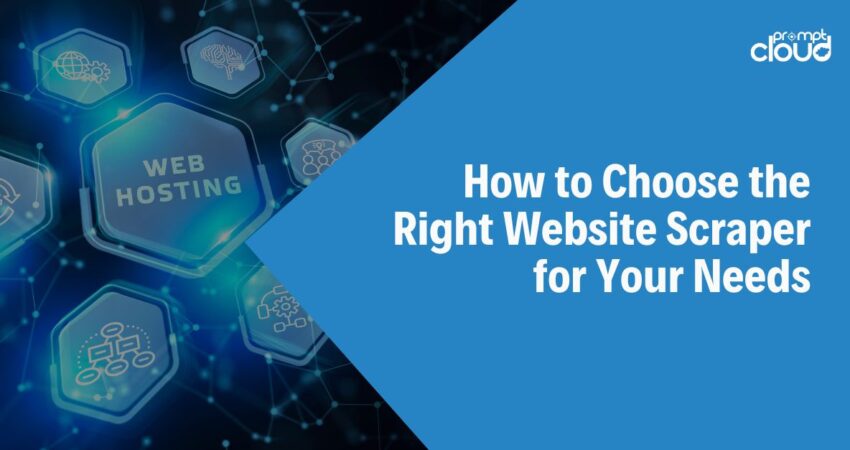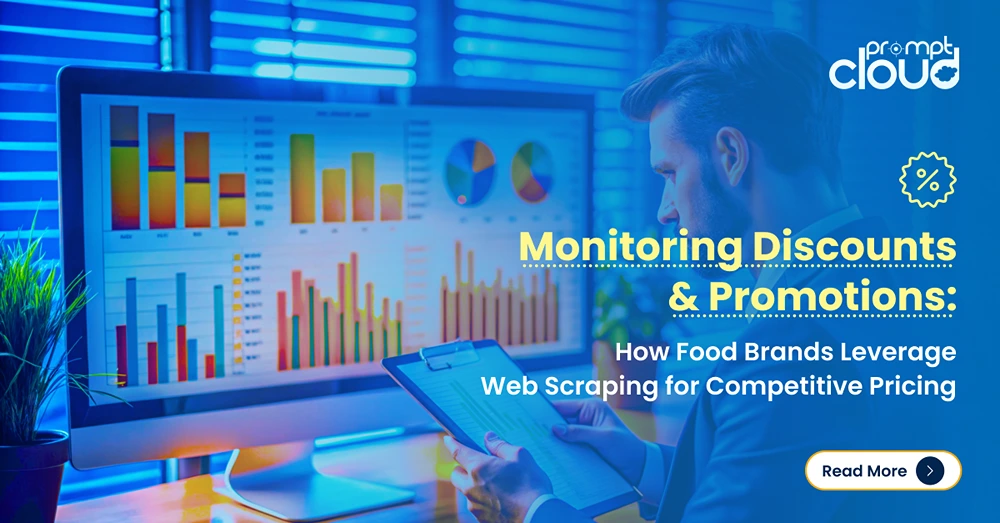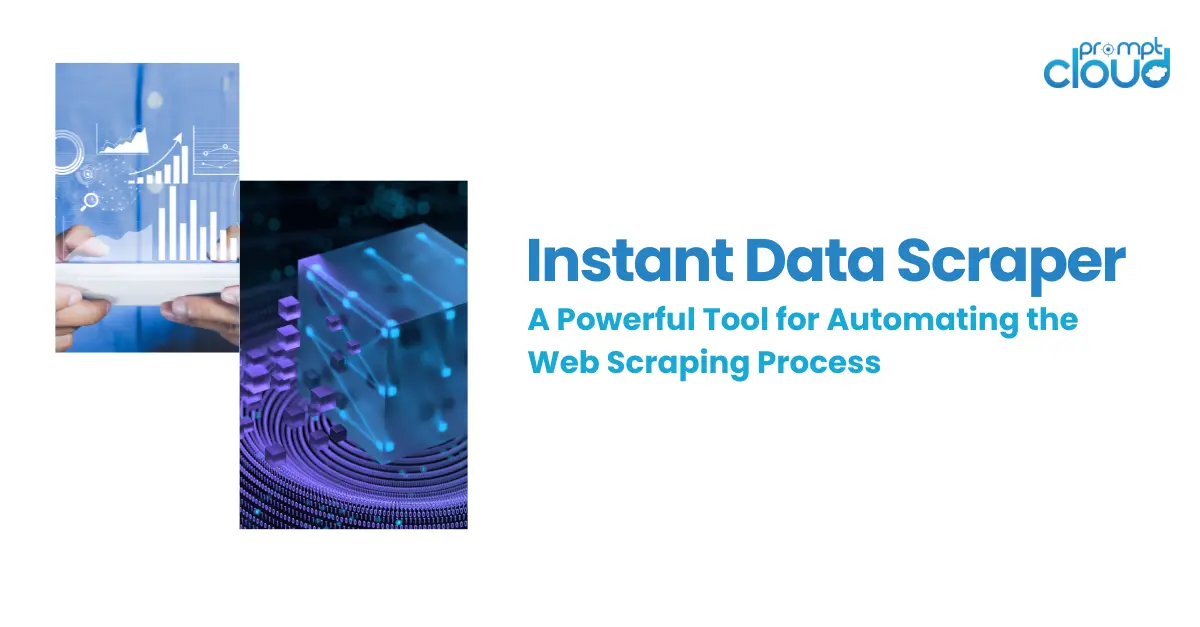
In today’s data-driven world, the ability to efficiently gather information from the web can give businesses a significant competitive edge. However, with a plethora of web scraping tools available, selecting the right one for your specific needs can be a daunting task. At PromptCloud, we understand the importance of making an informed choice, so we’ve compiled this comprehensive guide to help you select the perfect website scraper.
Source: https://geonode.com/blog/what-is-web-scraping
Understanding Your Scraping Needs
Before diving into the sea of scraping tools, it’s crucial to have a clear understanding of your requirements. Consider the following factors:
- Data Volume: Estimate the amount of data you need to scrape. Different tools are optimized for varying scales of data extraction.
- Complexity of Websites: Some websites are more complex than others, using technologies like AJAX and JavaScript, which can complicate data extraction.
- Data Format: Determine in what format you need the scraped data (CSV, JSON, Excel, etc.) to ensure compatibility with your data processing systems.
Key Features to Look For
Ease of Use
- User-Friendly Interface: Look for tools with intuitive interfaces that require minimal technical expertise.
- Documentation and Support: Comprehensive guides and responsive customer support can significantly enhance your scraping experience.
Flexibility and Scalability
- Customization Options: The ability to customize your web scraper or scraping tasks (headers, cookies, sessions) is vital for many projects.
- Scalable Solutions: Ensure the tool can handle an increase in data volume without significant additional costs or complexities.
Data Quality and Accuracy
- Advanced Data Parsing: Tools that offer advanced parsing capabilities can extract data more accurately.
- Error Handling: Robust error handling mechanisms ensure data integrity and minimize losses during the scraping process.
Legal and Ethical Compliance
- Respect for Robots.txt: Ethical website scraper or scraping tools adhere to the guidelines set forth in websites’ robots.txt files.
- Data Privacy Compliance: It’s crucial to choose tools that comply with data protection regulations like GDPR and CCPA.
Considering the Type of Web Scraping Tool
Open Source vs. Commercial Tools
- Open Source Tools are often free and customizable but might require more technical know-how and hands-on management.
- Commercial Tools typically offer more comprehensive features, including customer support and cloud-based options, suitable for non-technical users and large-scale operations.
DIY vs. Managed Service
- DIY Tools give you full control over the scraping process but require time and resources to manage.
- Managed Services, like PromptCloud, offer end-to-end solutions where all technical aspects are handled by experts, allowing you to focus on analyzing the data.
Evaluating Potential Tools
- Trial Versions: Test the tool with a trial version or demo to assess its capabilities and ease of use.
- Community and Reviews: Look for feedback from current users to gauge the tool’s performance and reliability.
- Cost Analysis: Consider both upfront and ongoing costs against the value and quality of data provided.
PromptCloud: Your Partner in Web Scraping
Choosing the right website scraper or web scraping tool is just the beginning. At PromptCloud, we provide comprehensive web scraping solutions that cater to all the above considerations, ensuring high-quality, scalable, and legally compliant data extraction services tailored to your business needs.
Whether you’re looking to gather market intelligence, monitor competitive landscapes, or capture consumer insights, our team of experts is here to help you navigate the complexities of web scraping and unlock the full potential of web data for your business.
Ready to elevate your data strategy with PromptCloud? Contact us today to discover how our bespoke web scraping solutions can transform your data collection efforts. Get in touch at sales@promptcloud.com
Frequently Asked Questions (FAQs)
1. Is it legal to scrape the web?
The legality of web scraping largely depends on several factors including the methods used for scraping, the type of data being collected, how the data is used, and the specific websites’ terms of service. Here’s a detailed breakdown:
General Legal Framework
- Public vs. Private Data: Generally, scraping publicly accessible information without bypassing any technical restrictions (like login requirements or CAPTCHA) falls into a legally gray area but is often considered permissible. However, scraping private data (data behind a login or meant for specific users) without permission can lead to legal challenges.
- Terms of Service: Many websites include clauses in their terms of service that explicitly prohibit web scraping. Violating these terms can potentially lead to legal actions under breach of contract laws, although the enforceability of such terms is still debated in various jurisdictions.
- Copyright Laws: Data collected through scraping must be used in a way that respects copyright laws. Reproducing or distributing copyrighted material without authorization can result in legal penalties.
- Data Protection and Privacy Laws: With the introduction of regulations like the GDPR in Europe and CCPA in California, the collection and use of personal data have become highly regulated. If the scraped data includes personal information, it is essential to ensure compliance with these laws to avoid hefty fines and legal issues.
Notable Legal Cases
Several legal cases have set precedents in the web scraping domain, with varying outcomes:
- hiQ Labs vs. LinkedIn: This case is often cited in discussions about web scraping legality. The court ruled in favor of hiQ, allowing them to scrape publicly available data from LinkedIn, indicating that accessing public information online can be considered lawful.
Best Practices for Legal Web Scraping
- Adhere to Robots.txt: This file on websites indicates which parts of a site can or cannot be crawled by bots. Respecting these rules can help avoid legal issues.
- Avoid Overloading Servers: Sending too many requests in a short period can be seen as a denial of service attack, leading to potential legal action.
- Seek Permission When in Doubt: If unsure about the legality of scraping a particular website, seeking explicit permission from the website owner is the safest approach.
While web scraping is not inherently illegal, the methods employed and the type of data collected can influence its legality. It’s crucial for businesses and individuals to consider the ethical implications, adhere to legal standards, and consult legal advice when planning to scrape data from the web, especially when dealing with copyrighted material, private data, or websites with specific prohibitions on scraping.
This overview is intended for informational purposes and should not be taken as legal advice. Always consult with a legal professional to understand the implications of web scraping in your jurisdiction and use case.
2. What does scraping a website do?
Web scraping is the process of using automated software to extract data and information from websites. This technique simulates the navigation of a human through the web, using a program to retrieve content from various web pages. The core functionalities and implications of web scraping include:
Data Extraction
- Collecting Information: Web scraping tools can gather text, images, videos, and other data displayed on websites.
- Structured Data Retrieval: These tools can organize unstructured web content into structured data, such as spreadsheets or databases, making it easier to analyze and use.
Automation of Data Collection
- Efficiency and Speed: Web scraping automates the laborious task of manually copying and pasting information from websites, significantly speeding up data collection and processing.
- Regular Updates: It can be scheduled to run at regular intervals, ensuring the data collected is up-to-date and reflecting any changes on the website.
Applications of Web Scraping
- Market Research: Businesses use web scraping to gather data on competitors, market trends, pricing strategies, and customer sentiments.
- SEO Monitoring: SEO professionals scrape web data to track keyword rankings, backlink profiles, and content strategies.
- Lead Generation: Sales and marketing teams scrape contact information and other relevant data to identify potential customers.
- E-commerce: Online retailers scrape product data from competitor websites for price comparison and market analysis.
- Academic Research: Researchers scrape data from the web for various studies, analysis, and academic projects.
Legal and Ethical Considerations
While web scraping is a powerful tool for data collection, it’s essential to navigate the legal and ethical considerations involved. This includes respecting copyright laws, adhering to website terms of use, and considering privacy regulations, especially when dealing with personal data.
Web scraping is a method to automate the extraction of web data in a structured format, used across industries for various purposes, from business intelligence to academic research. However, it requires careful consideration of legal and ethical guidelines to ensure compliance and respect for web content ownership and user privacy.
3. How do I completely scrape a website?
Completely scraping a website involves several steps, from planning and choosing the right tools to executing the scrape and processing the data. Here’s a comprehensive guide to effectively scrape a website in full compliance with legal and ethical standards:
Define Your Objectives
- Identify the Data You Need: Be clear about what information you’re looking to extract (e.g., product details, prices, articles).
- Determine the Scope: Decide whether you need to scrape the entire site or just specific sections.
Check Legal and Ethical Considerations
- Review the Website’s robots.txt: This file, typically found at website.com/robots.txt, outlines which parts of the site can be crawled by bots.
- Understand Terms of Service: Ensure scraping does not violate the website’s terms.
- Consider Privacy Laws: Be mindful of how you handle personal data, respecting laws like GDPR or CCPA.
Choose the Right Tools
- Selection Based on Complexity: Tools range from simple browser extensions for small-scale scraping to sophisticated software like Scrapy for Python, which is suited for larger, more complex projects.
- Cloud-Based Services: For extensive scraping tasks, consider using cloud-based web scraping services that manage IP rotation, CAPTCHA solving, and data extraction at scale.
Prepare Your Scraping Environment
- Install Necessary Software: Set up your chosen scraping tool or development environment.
- Configure Settings: Adjust settings for crawl rate, headers, and proxies if needed to mimic human browsing behavior and avoid blocking.
Implement Data Extraction Logic
- Write the Scraping Script: If using a programming tool, write the code to navigate the site, select the relevant data, and extract it. Pay attention to site structure changes that might affect your script.
- Use Selectors Wisely: Utilize CSS selectors, XPath, or regex to accurately target data.
Run the Scraper
- Test on a Small Scale: Initially, run your scraper on a small segment of the site to ensure it works correctly.
- Monitor and Adjust: Keep an eye on the scraper’s performance and make any necessary adjustments to deal with pagination, dynamic content, or any errors.
Data Post-Processing
- Clean and Format Data: Process the scraped data (e.g., removing duplicates, formatting dates) to ensure it’s usable and valuable.
- Store Data Appropriately: Save the data in a structured format, such as CSV, JSON, or directly into a database.
Respect Rate Limits and Avoid Overloading Servers
- Throttle Requests: Limit the number of requests to a website within a given timeframe to avoid overwhelming the server or getting your IP address banned.
Regular Updates and Maintenance
- Adapt to Changes: Websites often change their layout or structure, which may require you to update your scraping scripts.
- Schedule Regular Scrapes: If you need up-to-date information, schedule your scrapes to run automatically at regular intervals.
Tools and Libraries
- Python Libraries: BeautifulSoup, Scrapy, and Selenium are popular for custom scripts.
- Browser Extensions: Tools like Web Scraper (Chrome) and Import.io offer user-friendly interfaces for simple scraping tasks.
- Cloud Services: PromptCloud, Octoparse, and ParseHub provide managed scraping services that handle large-scale data extraction projects.
Completely scraping a website requires careful planning, execution, and ongoing management, especially considering the legal and ethical implications. By following these steps and using the right tools, you can efficiently collect the data you need while respecting the source website’s rules and user privacy. Remember, the key to successful web scraping lies in being respectful, ethical, and legal in your data collection practices.
4. Can ChatGPT do web scraping?
No, ChatGPT cannot perform web scraping. ChatGPT is designed to generate text based on the information it was trained on up until its last update in April 2023. It does not have the capability to access the internet in real-time, retrieve live data from websites, or interact with web pages. For web scraping tasks, you would need to use dedicated web scraping tools or services that are specifically designed for extracting data from websites. These tools can range from custom scripts written with web scraping libraries in programming languages like Python, to specialized software and cloud-based services that manage the scraping process for you.



















